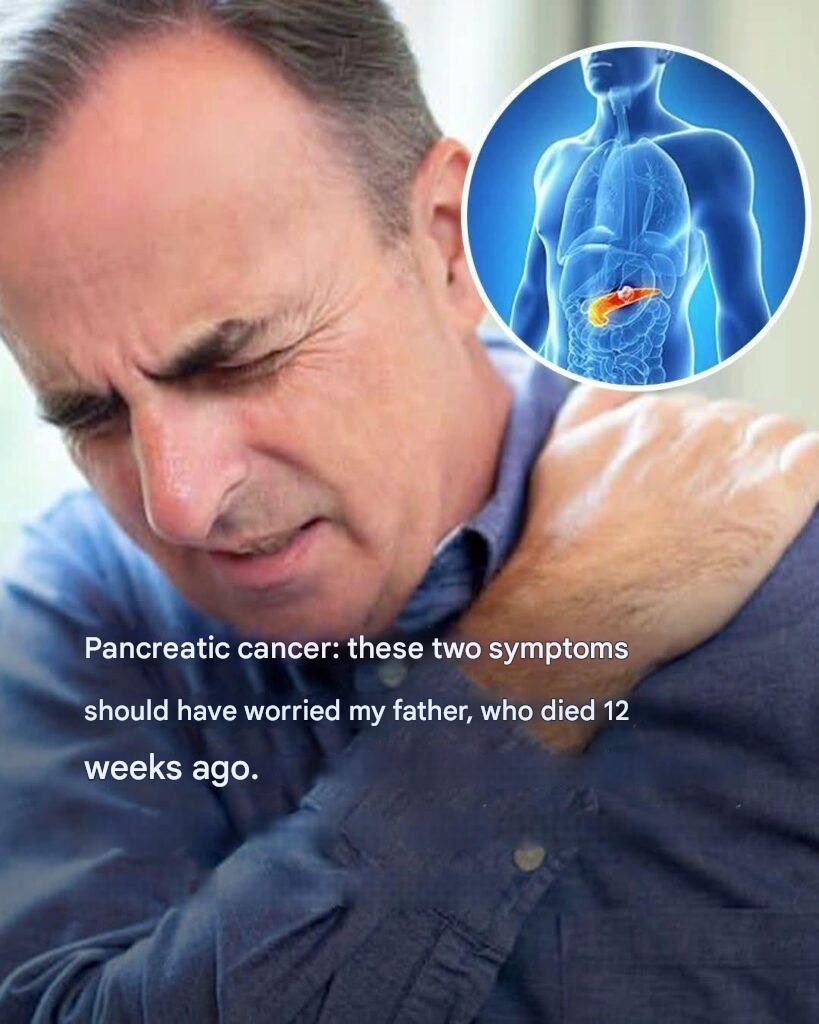-
New‑onset back or upper abdominal pain
-
Often dull, persistent, may radiate into the back; can feel deeper than typical “digestive” pain.
-
The image shows a man clutching his shoulder/upper area, a signal of pain being felt but perhaps dismissed.
-
In many cases of pancreatic cancer, pain is one of the earliest noticeable symptoms because the tumour presses on nearby nerves or tissues.
-
What to do: If you experience persistent upper abdominal or back pain that isn’t explained by other conditions (e.g., muscle strain) and it persists longer than a few weeks, get it evaluated.
-
-
Sudden onset of diabetes or worsening blood sugar control
-
One of the ‘silent’ early signs of pancreatic cancer is new or worsening diabetes, especially in someone without typical risk factors.
-
The pancreas produces insulin; tumour growth can impair its function and lead to hyperglycaemia.
-
What to do: If you are diagnosed with diabetes and it appears out of the blue, or if your previously well‑controlled diabetes worsens rapidly, ask your physician whether pancreatic health has been assessed.
-
These two symptoms together—persistent unusual pain + new/worsening diabetes—are particularly concerning and warrant prompt medical review.
Other Key Symptoms of Pancreatic Cancer
Beyond the two highlighted, here are several other signs you should know about:
-
Jaundice (yellowing of skin/eyes), pale stools, dark urine — when the tumour blocks the bile duct.
-
Unintended weight loss & loss of appetite — unexplained and rapid.
-
Digestive problems — nausea, vomiting, indigestion, fatty or clay‑coloured stools (steatorrhoea).
-
Back pain, unexplained fatigue or new‑onset blood clotting (e.g., deep vein thrombosis) — the tumour may affect blood vessels.
Importantly: many of these symptoms are non‑specific and may relate to benign conditions — but it’s the combination, newness, and persistence that should raise a red flag.
Why Early Detection Matters
Because the pancreas is tucked away and symptoms are often vague, pancreatic cancer is often diagnosed at a later stage when treatment prospects are more limited.
Recognising warning signs early can lead to investigations (imaging, blood tests, specialist referral) and potentially better outcomes.
Time matters: the sooner a suspected case is evaluated, the sooner therapies or surgery might be considered.
What to Do If You Notice These Symptoms
-
Don’t wait — contact your doctor. Be clear about symptom onset, duration, and any related changes (e.g., diabetes diagnosis).
-
Mention your concerns — if you have pain + new diabetes (or jaundice, weight loss, digestive issues) mention “pancreatic cancer” as a possibility so your GP can assess appropriateness of imaging or referral.
-
Prepare for evaluation — your doctor may order bloodwork (liver/bilirubin tests, CA 19‑9 tumour marker), imaging (CT or MRI abdomen), or refer you to a specialist (gastroenterologist/oncologist).
-
Track symptoms — keep note of when symptoms started, how they’ve progressed, what relieves or worsens them. This info helps clinicians.
-
Risk factor review — though anyone can get pancreatic cancer, known risk factors include smoking, chronic pancreatitis, family history, obesity and long‑standing diabetes.
Prevention & Risk Reduction
While there is no guaranteed way to prevent pancreatic cancer, you can reduce your risk:
-
Stop smoking and avoid heavy alcohol use.
-
Maintain a healthy weight and eat a diet rich in vegetables, fruits, lean protein and whole grains.
-
Control conditions like diabetes, pancreatitis, and ensure regular check‑ups if you have risk factors.
-
Discuss family history of pancreatic or related cancers with your doctor—some people may be eligible for screening or surveillance.
Final Thoughts
The image we began with tells a sobering story—a father’s diagnostic delay, a tragedy that might have had different possibilities if warning signs had been recognised earlier. Let that be a reminder: when something feels wrong, listen. New pain in the upper abdomen or back, unexpected diabetes, unexplained weight loss or jaundice—don’t dismiss them.
Early action matters. If in doubt, seek medical evaluation. It could make all the difference.

